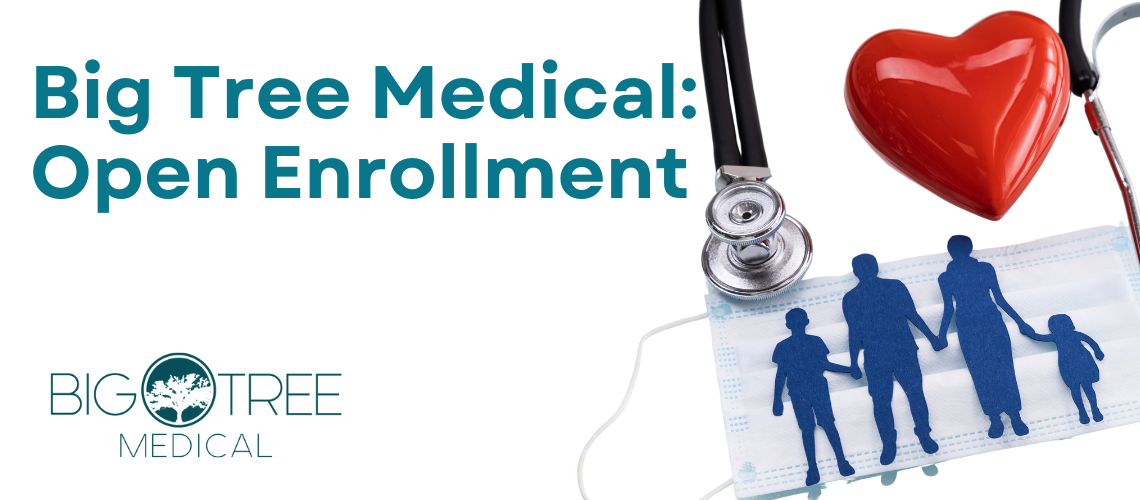
Flu vs. Common Cold: How to Tell the Difference & When to Call Us
As the weather changes and flu season kicks in, it can be tough to tell if you're dealing with the flu or just a common cold. Both illnesses share similar symptoms, but knowing the difference can help you get the right treatment and recover faster. At
Big Tree Medical, we’re here to support your health every step of the way—whether it's answering your questions on Spruce or providing care when you need it most.
Symptoms: Flu vs. Common Cold
Though flu and cold symptoms often overlap, there are key differences to help you determine which illness you might have:
Common Cold Symptoms
- Runny or stuffy nose
- Sneezing
- Sore throat
- Mild cough
- Mild fatigue
- Low-grade fever (sometimes)
Colds tend to develop gradually, and symptoms are generally mild, improving within a few days to a week. You can often manage a cold with rest, fluids, and over-the-counter remedies.
Flu Symptoms
- High fever (usually 100.4°F or higher)
- Sudden onset of fatigue or body aches
- Headaches
- Dry cough
- Sore throat
- Chills and sweats
- Muscle or body aches
- Shortness of breath (sometimes)
Flu symptoms come on quickly and are typically more intense than cold symptoms. If you suspect you have the flu, it’s important to act quickly, especially if you’re at higher risk for complications.
Recommended Treatment: Flu vs. Cold
The treatment for the flu and a common cold varies depending on the severity of your symptoms and health status.
For the Common Cold:
- Rest and hydration: Allow your body to recover by getting plenty of sleep and drinking fluids.
- Over-the-counter medications: Decongestants, pain relievers (like ibuprofen or acetaminophen), nasal saline spray or rinse, and cough syrups can help manage symptoms.
- Humidifier or steam: To soothe nasal passages and relieve a stuffy nose.
Since colds are caused by viruses, antibiotics won’t help. The best course of action is to let it run its course while managing your symptoms.
For the Flu:
- Antiviral medication: If diagnosed within the first 48 hours, antiviral drugs like Tamiflu can help shorten the duration of the flu and reduce its severity.
- Stay home and rest: Flu can be contagious for several days, so stay home, rest, and avoid contact with others.
- Fluids and pain relief: Hydration and over-the-counter pain relievers can alleviate fever, headache, and muscle aches.
If you're experiencing severe symptoms or are at higher risk for flu complications, such as young children, older adults, pregnant women, or those with chronic conditions, it's important to seek medical advice.
When to Contact Big Tree Medical
If you're unsure whether you're dealing with the flu or a cold, or if your symptoms worsen, don’t hesitate to reach out! We encourage you to message your provider on the Spruce app with any questions.
At Big Tree Medical, we're available 24/7 through the Spruce app, so you can reach out whenever you need support. Here are some signs that you should contact us immediately:
- Difficulty breathing or shortness of breath
- A high fever (over 102°F) that persists for more than 5 days and doesn’t respond to medication
- Persistent pain or pressure in the chest
- Severe weakness or dizziness
- Worsening symptoms after initial improvement
If you're experiencing any of these symptoms, it's important to get medical advice as soon as possible.
Preventive Measures
- Get your flu shot: It’s your best defense against the flu. Contact us today to schedule your flu vaccination.
- Wash your hands frequently: Proper handwashing can prevent the spread of viruses.
- Stay home when sick: If you feel under the weather, avoid work or school to prevent spreading the illness.
We're Here for You
Whether you're fighting off a cold or dealing with flu symptoms, Big Tree Medical is here to help. Don't hesitate to message us on the Spruce app if you have questions or need advice. We’re always just a tap away to provide the care and guidance you need.
Stay healthy this season, and remember—you don’t have to navigate your health journey alone!



